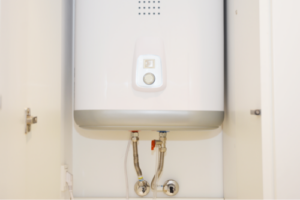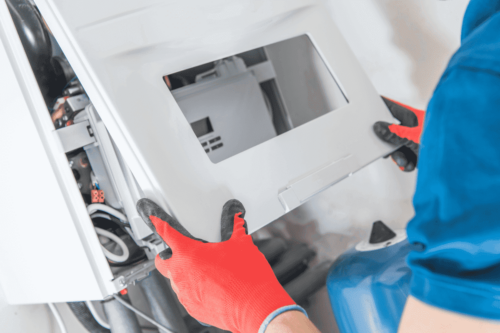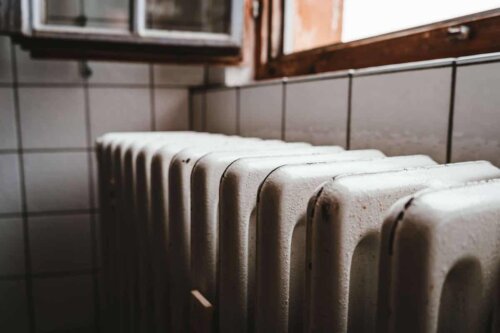Advantages and Disadvantages of Condensing Boilers

Condensing boilers are simple, practical, and help you save on your monthly energy consumption. Their thermal characteristics are really efficient, more than that of traditional ones at least. As if that wasn’t enough, they’re also environmentally friendly.
Are you thinking about renewing your heating system? Keep reading before making a decision. Below you’ll learn about the characteristics of condensing boilers, and their advantages and disadvantages.
Condensing boilers
This type of boiler evolved from traditional gas ones. It was the answer to the need to maximize the energy used by the appliance by minimizing waste.
In this respect, the heated steam is the product of combustion so there’s less loss of heat.

How do condensing boilers work?
Firstly, keep in mind that the boiler is in charge of producing heat and transferring it to the water present in the installation of any given building. However, traditional boilers generate heat from the evaporation that takes place.
The mechanism of condensing boilers is more efficient because a chemical reaction occurs with condensation and the steam turns into liquid. This change generates a type of energy known as latent heat, which is present in combustion.
Combustion is a chemical process in which a certain fuel (gas) reacts when mixed with oxygen and gives off calorific power in the form of energy. It results in carbon dioxide (CO2) and steam (H2O).
This latent heat goes out during condensation of the steam produced in the combustion process and transfers to the water to heat it. Thus, one can save up to 30% on gas consumption. Also, the emission of polluting gases decreases by recovering this energy.
Find out What Are the Causes of Dry Skin
Advantages of condensing boilers
The advantages of condensing boilers are many and range from economic to environmental. Let’s review some of them.
High energy efficiency
As we explained above, harnessing the energy in the combustion fumes is more efficient than doing so with conventional boilers. Condensing boilers can be 100% efficient.
Quiet operation
Condensing boilers regulate their flame according to demand and don’t switch on and off from time to time. This way you don’t hear the sound of the combustion.
Economic savings
As aforementioned, the consumption of these types of boilers is regulated in such a way that it has a positive impact on the gas bill. In other words, you’ll recover the extra cost of purchasing a condensing boiler in a few years.
Less pollution
Condensation droplets carry away part of the combustion waste that pollutes the environment. This is because it reduces oxygen, nitrogen, and carbon dioxide emissions by up to 70%.
Widespread use of condensing boilers would help control emissions of toxic gases that generate acid rain and the greenhouse effect in the atmosphere.
Simple installation
Modern boiler designs include a metal template with tabs that attach to the wall. The appliance is then easily and quickly snapped into place.
Learn: How to Make an Acoustic Insulator at Home
Disadvantages of condensing boilers
While these boilers have numerous benefits, they also have some disadvantages that we’re about to list. Mainly so you can evaluate the pros and cons.
Cost
Condensing boilers are a little more expensive than traditional boilers. However, they’ll pay for themselves thanks to the energy savings in just a few years, as we mentioned above.
Drainage
These boilers require an additional drain for the elimination of the condensed gases. Their chimney also requires proper installation as condensation will lead to drips if it isn’t in the right position.

Condensing boilers: worth the change
We believe condensing boilers are great because the benefits outweigh any disadvantages. Not only will you choose an environmentally friendly appliance but you’ll also make better use of household energy.
You’ll soon notice a decrease in the gas bill that’ll justify the initial cost of this type of boiler in the long run. So, have we convinced you yet?
All cited sources were thoroughly reviewed by our team to ensure their quality, reliability, currency, and validity. The bibliography of this article was considered reliable and of academic or scientific accuracy.
- Básica, G. Calderas de condensación. Comunidad de Madrid.
- Pozo, I. L. (2008). El gas en la edificación: Calderas de condensación. Gas actual, (108), 46-51.
- Fernández, A. B. (2018). BANCO DE ENSAYOS DE CALDERAS DE CONDENSACIÓN DE GAS NATURAL.
- Prieto, U. (2019). Calderas de gas de condensación: confort, seguridad y sostenibilidad en casa. Gas actual, (153), 44-46.
- San José, R. G. CALDERAS DE AGUA CALIENTE.
- Pérez, S. P. (2015). Los nuevos reglamentos sobre Ecodiseño y Etiquetado Energético, la gran oportunidad para el mercado de la condensación. El Instalador, (525), 41.
This text is provided for informational purposes only and does not replace consultation with a professional. If in doubt, consult your specialist.








